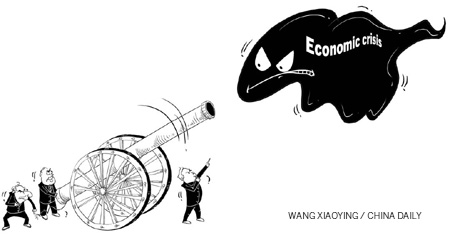-
News >Bizchina
New reality calls for shared norms
2011-01-27 15:38
Following a decade characterized by an explosion of global challenges, and most recently a structural economic crisis, we now live in a completely new reality. Never before has the world faced so many serious challenges simultaneously. Leaders from all sectors of society are finding it increasingly difficult to navigate this new reality. Our old tools and models to address these problems don't work anymore. We are living in a world that is becoming increasingly complex and interconnected and, at the same time, experiencing an erosion of common values and principles that undermines public trust in leadership as well as future economic growth and political stability.
As we begin the second decade of the 21st century, humanity is at a crossroads. We can either continue to work as lobbyists for our narrowly defined self-interests and keep doing the same old things that got us into the crisis in the first place. Or we can act together as true global leaders, with long-term global public interest in mind and at heart.
Following the economic crisis of the past two years, we have now entered a new era of austerity and greater modesty. In this new reality, collective sacrifices must be made to safeguard and enhance our future. While a total collapse of the global financial system was averted, governments around the world have gone into huge debts to do so. In the short term, this is leading to higher taxes, reductions in social and public health systems as well as reduced investments in education and infrastructure.
As the economic center of gravity continues to move to the East and the South, it will create political, economic and social shock waves. And new global players - in particular non-state actors - are emerging at an unforeseen pace. This new fluid global power structure, marked by greater expressions of national interests, may lead countries to look primarily inward when attempting to solve any problem.
Looking ahead, the new reality will also be characterized by growing resource scarcity, and this will have serious implications on energy, food and water security. The traditional borders between business and government will continue to erode because neither governments nor civil society alone can confront the complexity of global challenges that we face.
All these dimensions of the new reality require first and foremost a common approach: Basic values and shared norms should be turned into positive forces driving our future. It also requires a new sense of "global togetherness".Related readings:
 Euro zone working on package to solve crisis: Germany
Euro zone working on package to solve crisis: Germany Euro debt crisis likely to spill into 2011
Euro debt crisis likely to spill into 2011 Tackling Europe's debt crisis
Tackling Europe's debt crisisThis is why we will focus on shared norms for the new reality as the theme at this year's Annual Meeting of the World Economic Forum in Davos. Norms are vital for providing fundamental guidance to decision makers who operate in this new reality, which still lacks an effective formal and globalized legal infrastructure.
They also provide the compass that can guide the decision-making of leaders and help ensure inclusive rather than exclusive outcomes. Without such shared norms, our efforts of reforming global systems will lack direction and, in the worst case, prove to be ineffective. Shared norms will also help define a common vision for the future that we want to create.
International cooperation is everybody's business now. More than ever, the new reality underscores the need to create new bonds rather than new boundaries. We need new partnerships and alliances between public, private and civic life to tackle the problems that lie ahead.
We are more likely to succeed in managing global challenges if we take a practical, multifaceted approach, focusing at least as much on the "how" as the "what". It will force us to set aside our immediate short-term interests and take the long-term global public interest to heart.
This may prove to be difficult. But one thing is certain: We cannot keep doing the same old thing in a new era that requires new responses.
The author is founder and executive chairman of the World Economic Forum.
